 Maurice (1987)
Maurice (1987)
Director: James Ivory
Writers: E.M. Forster (from the novel by), Kit Hesketh-Harvey (screenplay),James Ivory (screenplay)
Genre: Drama
Country: UK
Language: English
Year: 1987
Duration: 140 min
Stars: James Wilby, Rupert Graves, Hugh Grant
 Maurice je film iz 1987. godine, snimljen po istoimenom romanu E.M. Forstera. Priča o gej ljubavi s početka 20. vijeka u Engleskoj, prati život Maurice Halla od njegovih školskih dana nadalje.
Maurice je film iz 1987. godine, snimljen po istoimenom romanu E.M. Forstera. Priča o gej ljubavi s početka 20. vijeka u Engleskoj, prati život Maurice Halla od njegovih školskih dana nadalje.
Film, u produkciji Merchant Ivory Production i Channel Four Films, režirao je James Ivory, a producirao Ismail Merchant. U glavnim ulogama su James Wilby, Hugh Grant i Rupert Graves. U sporednim ulogama se pojavljuju Denholm Elliott, Simon Callow, Billie Whitelaw i Ben Kingsley.
Radnja filma odvija se prije Prvoga svjetskog rata, kada je homoseksualnost bila zabranjena u Britaniji. Dvojica studenata s Cambridgea postaju bliski prijatelji, a zatim jednog dana jedan prizna drugomu da ga voli. Iako ga isprva odbije, Maurice (James Wilby) ipak prihvati Cliveovu izjavu te želi fizički iskazati svoje osjećaje. Clive (Hugh Grant) želi da njihova ljubav ostane platonska – aristokrat je koji je od malih nogu naučen potiskivati osjećaje i, više od svega, boji se da ih ne otkriju i ne stave na stup srama.
Ubrzo se vrati ustaljenoj tradiciji te se oženi. Maurice je očajan. No tada upozna Scuddera (Rupert Graves), lovočuvara na Cliveovu posjedu, te oni započnu strastvenu seksualnu vezu.
Razlike u odnosu na roman
 Maurice je na početku filma prikazan kao dečak od 11 godina, dok u romanu ima 14. U filmu su izostavljeni gotovo svi filozofski dijalozi i mnogi sporedni zapleti, kao na primer, Mauriceova zaljubljenost u školskog druga, Dickiea. U filmu je posvećeno više pažnje Risleyju, koji je osuđen na 6 meseci teškog rada zbog homoseksualnosti (u romanu nije zatvoren) kako bi se dramatizovala opasnost koju je homoseksualnost nosila u edvardijanskoj eri i da bi se obezbedio jasniji kontekst savremenoj publici zbog koga Clive oseća da mora da odbije Mauricea.
Maurice je na početku filma prikazan kao dečak od 11 godina, dok u romanu ima 14. U filmu su izostavljeni gotovo svi filozofski dijalozi i mnogi sporedni zapleti, kao na primer, Mauriceova zaljubljenost u školskog druga, Dickiea. U filmu je posvećeno više pažnje Risleyju, koji je osuđen na 6 meseci teškog rada zbog homoseksualnosti (u romanu nije zatvoren) kako bi se dramatizovala opasnost koju je homoseksualnost nosila u edvardijanskoj eri i da bi se obezbedio jasniji kontekst savremenoj publici zbog koga Clive oseća da mora da odbije Mauricea.
Scena poslednjeg sastanka Mauricea i Aleca prikazana je u pseudo-elizabetanskom kupatilu uz aluzije na Arts and Crafts sa kojim je povezan Edward Carpenter (E.M. Forster je dobio inspiraciju za roman kada je posetio Carpentera i njegovog partnera George Merrilla), ali i na Christophera Marlowea i Shakespearea.
 Britansko konzervativno izrazito klasno društvo ima pravilo da pokazivanje emocija mora biti strogo kontrolisano i iskazano na društveno prihvatljiv način. Licemjerno su osuđivali svakoga iz svoje "više klase" ko bi popustio svojim ljudskim nagonima i javno izrazio ljubav, oduševljenje ili starstvenost. Homoseksualnost koja je do iza drugog svjetskog rata bila osuđivana na najgore moguće načine ( vješanje, kastriranje, itd) se smatrala društveno neprihvatljivom bolešću i o njoj se moglo pričati samo kao nezamislivom grijehu starih grka od čijih filozofskih misli se izgradila današnja evropska moderna civilizacija. Naravno u višim klasnim krugovima je sve bilo malo tolerantnije ukoliko bi svoje "emocije i neprihvatljive misli zadržali u prihvatljivim okvirima, dok bi niži sloj društva bivao osuđen na smrt.
Britansko konzervativno izrazito klasno društvo ima pravilo da pokazivanje emocija mora biti strogo kontrolisano i iskazano na društveno prihvatljiv način. Licemjerno su osuđivali svakoga iz svoje "više klase" ko bi popustio svojim ljudskim nagonima i javno izrazio ljubav, oduševljenje ili starstvenost. Homoseksualnost koja je do iza drugog svjetskog rata bila osuđivana na najgore moguće načine ( vješanje, kastriranje, itd) se smatrala društveno neprihvatljivom bolešću i o njoj se moglo pričati samo kao nezamislivom grijehu starih grka od čijih filozofskih misli se izgradila današnja evropska moderna civilizacija. Naravno u višim klasnim krugovima je sve bilo malo tolerantnije ukoliko bi svoje "emocije i neprihvatljive misli zadržali u prihvatljivim okvirima, dok bi niži sloj društva bivao osuđen na smrt.
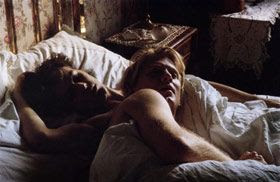 Iako je današnja Britanija uznapredovala i odbacila stavove da je homoseksualnost bolest, pravilo da se emocije pokazuju na "prikladan način" se smatra džentelmenskim. Za nas južnjake sve to može biti jako smješno, ponekad i seksi, ali najčešće razočaravajuće.
Iako je današnja Britanija uznapredovala i odbacila stavove da je homoseksualnost bolest, pravilo da se emocije pokazuju na "prikladan način" se smatra džentelmenskim. Za nas južnjake sve to može biti jako smješno, ponekad i seksi, ali najčešće razočaravajuće.
Možete li zamisliti da nakon lude noći u kojoj ste se prepustili najperverznijim željama,nagutali sperme i izjebali se ko nikad u životu vaš "džentelmen" nakon što se obukao kaže: " Bilo mi je zadovoljstvo upoznati Vas, nadam se da ćemo se sresti u nekoj prikladnijoj prilici od ove, naravno ukoliko ste i Vi spremni da produžimo naš partnerski odnos"
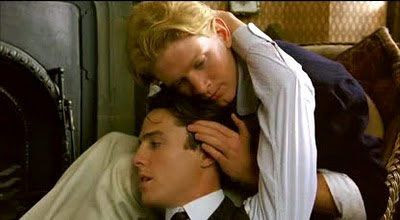 Iako se London smatra današnjom gay prijestonicom evrope, može vam desiti da dobijete upozorenje da pričanje o ubacivanju vašeg spolovila u nečiju stražnjicu nije prihvatljivo i da je ustvari tako nešto očekivano samo od primitivne klase ljudi.
Iako se London smatra današnjom gay prijestonicom evrope, može vam desiti da dobijete upozorenje da pričanje o ubacivanju vašeg spolovila u nečiju stražnjicu nije prihvatljivo i da je ustvari tako nešto očekivano samo od primitivne klase ljudi.
 Ipak iako je kulturološka razlika britanskog i balkanskog mentaliteta drastično velika, sličnosti se ipak svode na emocijama koje su sastavni dio svakog ljudskog bića. U ovom slučaju ljubav, strast i strah od odbačenosti i neuspjeha u društvu.
Ipak iako je kulturološka razlika britanskog i balkanskog mentaliteta drastično velika, sličnosti se ipak svode na emocijama koje su sastavni dio svakog ljudskog bića. U ovom slučaju ljubav, strast i strah od odbačenosti i neuspjeha u društvu.
Bez obzira da li vaša okolina homoseksualnost tretira kao bolest ili ne, kao gej u nekoj od balkanskih država morate biti svjesni da vaša različitost mora biti iskazana na društveno prihvatljivi način kako bi mogli biti prihvaćeni kao osoba vrijedna poštovanja bez obzira na seksualnu orjentaciju. Biti outovan ili ne, stvar je vaše lične procjene, ali ovog ovog pravila se uvjek pridržavajte.
”England has always been disinclined to accept human nature” – E.M. Forster
 1909. Maurice Hall (James Wilby) is an undergraduate at Kings College, Cambridge. While there, he meets and falls in love with Clive Durham (Hugh Grant). Although they are very close, and continue to be so after University, their love is never consummated. But then Clive, scared by the arrest on an immorality charge of a University friend who later commits suicide, breaks off their relationship, leaving Maurice devastated….
1909. Maurice Hall (James Wilby) is an undergraduate at Kings College, Cambridge. While there, he meets and falls in love with Clive Durham (Hugh Grant). Although they are very close, and continue to be so after University, their love is never consummated. But then Clive, scared by the arrest on an immorality charge of a University friend who later commits suicide, breaks off their relationship, leaving Maurice devastated….
 E.M. Forster wrote Maurice around 1914 but due to concerns about the acceptability of its subject matter, he didn’t let it be published until after his death. The novel finally appeared in 1971. It’s usually considered one of his weaker novels, but as is often the way, the lesser novel makes for a better film. In my mind it’s the best of the three films Merchant Ivory made from Forster’s work, and one of their best films overall.
E.M. Forster wrote Maurice around 1914 but due to concerns about the acceptability of its subject matter, he didn’t let it be published until after his death. The novel finally appeared in 1971. It’s usually considered one of his weaker novels, but as is often the way, the lesser novel makes for a better film. In my mind it’s the best of the three films Merchant Ivory made from Forster’s work, and one of their best films overall.
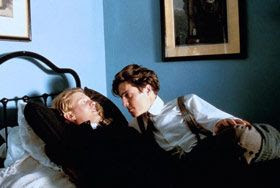 Why is this? There’s a case to be made that Forster as a novelist was crippled by his own sexual orientation, to which he never adjusted. (And let’s not forget that male homosexuality was illegal in Britain until 1967, leaving gay men open to blackmail and long prison sentences, not to mention possible Oscar Wilde-like public disgrace.) Maurice was clearly a very personal work, to which he rather sentimentally gave a happy ending. As Merchant and Ivory are a gay couple of long standing, you can see how this would appeal to them. I’m not sure if Ivory is correct in claiming that this film was the first unapologetic gay love story (complete with brief full-frontal male nudity), with his hero not suicidal at the end but happily in a relationship with gamekeeper Alec Scudder (Rupert Graves), one that cuts across class barriers as well as sexual ones. But it’s certainly an early example of such a film. It’s hard to imagine Merchant Ivory as radical filmmakers, but just this once, in their oh-so-discreet and polite way, they may have slipped something subversive past their audience. Seventeen years later – and I speak as someone who saw Maurice on its cinema release – it may be hard to realise what the fuss was about. But back in 1987, the AIDS epidemic was only six years old, and as Ivory says if Maurice had been made very much earlier it might have attracted more condemnation than it did.
Why is this? There’s a case to be made that Forster as a novelist was crippled by his own sexual orientation, to which he never adjusted. (And let’s not forget that male homosexuality was illegal in Britain until 1967, leaving gay men open to blackmail and long prison sentences, not to mention possible Oscar Wilde-like public disgrace.) Maurice was clearly a very personal work, to which he rather sentimentally gave a happy ending. As Merchant and Ivory are a gay couple of long standing, you can see how this would appeal to them. I’m not sure if Ivory is correct in claiming that this film was the first unapologetic gay love story (complete with brief full-frontal male nudity), with his hero not suicidal at the end but happily in a relationship with gamekeeper Alec Scudder (Rupert Graves), one that cuts across class barriers as well as sexual ones. But it’s certainly an early example of such a film. It’s hard to imagine Merchant Ivory as radical filmmakers, but just this once, in their oh-so-discreet and polite way, they may have slipped something subversive past their audience. Seventeen years later – and I speak as someone who saw Maurice on its cinema release – it may be hard to realise what the fuss was about. But back in 1987, the AIDS epidemic was only six years old, and as Ivory says if Maurice had been made very much earlier it might have attracted more condemnation than it did.
 Many Merchant Ivory films are full of surface pleasures: sumptuous costume and production design and camerawork, making a relatively small budget seem much larger, not to mention literate dialogue and fine performances from some very distinguished actors. But what is often missing is passion: you don’t sense an overwhelming urge to make this film rather than something else. That isn’t the case with Maurice though, which is constantly engaging and in places quite moving if a little overlong. Merchant Ivory’s usual scriptwriter Ruth Prawer Jhabvala was committed to a novel at the time and didn’t feel comfortable with the subject matter, so the screenplay is the work of Kit Hesketh-Harvey (of cabaret act Kit and the Widow) and Ivory. As Hesketh-Harvey admits, much of the dialogue comes straight from the book.
Many Merchant Ivory films are full of surface pleasures: sumptuous costume and production design and camerawork, making a relatively small budget seem much larger, not to mention literate dialogue and fine performances from some very distinguished actors. But what is often missing is passion: you don’t sense an overwhelming urge to make this film rather than something else. That isn’t the case with Maurice though, which is constantly engaging and in places quite moving if a little overlong. Merchant Ivory’s usual scriptwriter Ruth Prawer Jhabvala was committed to a novel at the time and didn’t feel comfortable with the subject matter, so the screenplay is the work of Kit Hesketh-Harvey (of cabaret act Kit and the Widow) and Ivory. As Hesketh-Harvey admits, much of the dialogue comes straight from the book.
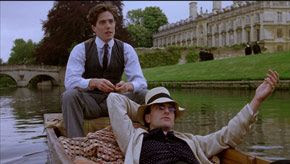 Apart from the central three (and Graves doesn’t appear until after the halfway mark), most of the roles are little more than adroitly-played cameos. (Helena Bonham Carter turns up uncredited as a spectator at a cricket match.) Although Wilby and Graves are excellent, it’s Hugh Grant’s Clive on which the film turns. Grant has played the silly-ass dithering Englishman a few too many times in Four Weddings and a Funeral and its follow-ups, so it’s easy to forget how good an actor he can be. Clive is one of his best roles, along with another gay role in the little-seen An Awfully Big Adventure. Clive’s platonic love for Maurice dominates the first half of the film and it’s Clive’s crisis of conscience which causes the key event in the film, when he rejects Maurice. Although we see Maurice leave for a hopefully happy future as a gay man, we end the film with Clive. As he gazes out of a window, the camera looks in at him, his wife Anne (a deft performance of uncloying sweetness from Phoebe Nicholls, an actress much underused by the British Film Industry) clearly in love with him but he will never be able to reciprocate, the frame of the window like the bars of a prison of his own making.
Apart from the central three (and Graves doesn’t appear until after the halfway mark), most of the roles are little more than adroitly-played cameos. (Helena Bonham Carter turns up uncredited as a spectator at a cricket match.) Although Wilby and Graves are excellent, it’s Hugh Grant’s Clive on which the film turns. Grant has played the silly-ass dithering Englishman a few too many times in Four Weddings and a Funeral and its follow-ups, so it’s easy to forget how good an actor he can be. Clive is one of his best roles, along with another gay role in the little-seen An Awfully Big Adventure. Clive’s platonic love for Maurice dominates the first half of the film and it’s Clive’s crisis of conscience which causes the key event in the film, when he rejects Maurice. Although we see Maurice leave for a hopefully happy future as a gay man, we end the film with Clive. As he gazes out of a window, the camera looks in at him, his wife Anne (a deft performance of uncloying sweetness from Phoebe Nicholls, an actress much underused by the British Film Industry) clearly in love with him but he will never be able to reciprocate, the frame of the window like the bars of a prison of his own making.
Visit: Orvel.Me





 Slatka, slojevita filmska priča o mladom Dominikancu Eliotu, njegovom odrastanju sa majkom koja bezuspješno pokušava da nađe ljubav svog života i kako se to kasnije odražava na Eliotovu potrebu da nađe srodnu dušu.
Slatka, slojevita filmska priča o mladom Dominikancu Eliotu, njegovom odrastanju sa majkom koja bezuspješno pokušava da nađe ljubav svog života i kako se to kasnije odražava na Eliotovu potrebu da nađe srodnu dušu.  Film je na momente komičan, naspram tragičnih scena iz Eliotovog djetinjstva pa to malo ruši kontinuitet u gledanju jer se teško emocionalno prebacivati iz jedne priče u drugu, ali u svakom slučaju ordžaće vam pažnju do samog kraja.
Film je na momente komičan, naspram tragičnih scena iz Eliotovog djetinjstva pa to malo ruši kontinuitet u gledanju jer se teško emocionalno prebacivati iz jedne priče u drugu, ali u svakom slučaju ordžaće vam pažnju do samog kraja.  Mene je podsjetio na jednog momka iz Beograda. Upoznao sam ga u porno bioskopu "PARTIZAN". znate već to je jedan od onih prljavih i mračnih mjesta gje u muklom mraku, tobože gledajući pornić, drkate kurac u društvu silueta oko vas. Bilo je tu i seksa kao u današnjim Dark room prostorijama, ali uglavnom se sve završavalo samo na drkanju.
Mene je podsjetio na jednog momka iz Beograda. Upoznao sam ga u porno bioskopu "PARTIZAN". znate već to je jedan od onih prljavih i mračnih mjesta gje u muklom mraku, tobože gledajući pornić, drkate kurac u društvu silueta oko vas. Bilo je tu i seksa kao u današnjim Dark room prostorijama, ali uglavnom se sve završavalo samo na drkanju.  Viđali smo se narednih 5-6 dana svakodnevno, izlažeči po klubovima, pivnicama, picerijama ili naprosto šetajuči gradom i povremeno se jebali u javnim WC-ima, parkovima ili bi naprosto ušli u neku zgradu ili prolaz, spustili se u podrum i tu se kresnuli ostavljajući iza sebe pune kondome.
Viđali smo se narednih 5-6 dana svakodnevno, izlažeči po klubovima, pivnicama, picerijama ili naprosto šetajuči gradom i povremeno se jebali u javnim WC-ima, parkovima ili bi naprosto ušli u neku zgradu ili prolaz, spustili se u podrum i tu se kresnuli ostavljajući iza sebe pune kondome. 
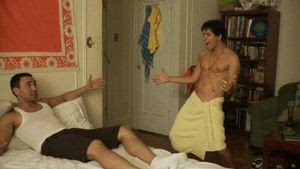 Elliot Loves explores the turbulent love life of Elliot throughout two pivotal parts of his life, as an inquisitive 10-year-old dealing with his loving yet seemingly unhappy mother and as a naive 21-year-old looking for love in all the wrong places in New York.
Elliot Loves explores the turbulent love life of Elliot throughout two pivotal parts of his life, as an inquisitive 10-year-old dealing with his loving yet seemingly unhappy mother and as a naive 21-year-old looking for love in all the wrong places in New York. 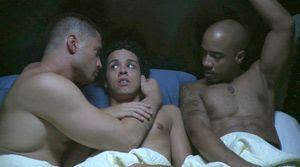 The film is funny in parts, and bittersweet and sad in others, but the scenes in the past have to be given credit as the better parts of the film. This is mainly due to the acting from Quentin Araujo as the young Elliot and Elena Goode as his mother, as they make you laugh and feel sympathy for the characters. These are without a doubt the stand out performances of the film.
The film is funny in parts, and bittersweet and sad in others, but the scenes in the past have to be given credit as the better parts of the film. This is mainly due to the acting from Quentin Araujo as the young Elliot and Elena Goode as his mother, as they make you laugh and feel sympathy for the characters. These are without a doubt the stand out performances of the film.  However it isn’t all good, and unfortunately the bad definitely outweighs them. At the very beginning of the film I initially thought, “What the hell is this?” as it starts off a bit hammy. Even though it gets better, the present day scenes always fall into the hammy, trying too hard to be funny category, and as we all know, when you try too hard it just isn’t funny. Much of the dialogue and scenes could have been cut or shortened, as a few parts feel like they’ve been on for around 20 minutes, despite actually only being on for about five.
However it isn’t all good, and unfortunately the bad definitely outweighs them. At the very beginning of the film I initially thought, “What the hell is this?” as it starts off a bit hammy. Even though it gets better, the present day scenes always fall into the hammy, trying too hard to be funny category, and as we all know, when you try too hard it just isn’t funny. Much of the dialogue and scenes could have been cut or shortened, as a few parts feel like they’ve been on for around 20 minutes, despite actually only being on for about five. 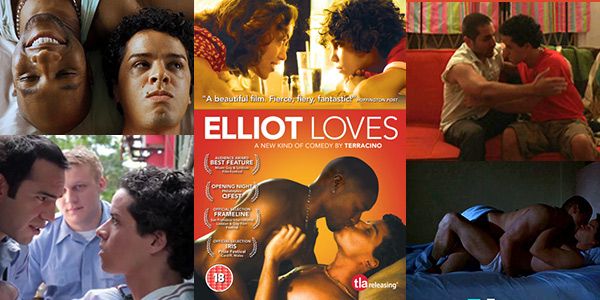


 I Want Your Love (2012)
I Want Your Love (2012) Holivudski glumac Džejms Franko kritikovao je Australiju, jer je zabranila prikazivanje američkog filma sa gej temom ''I Want Your Love'', nazivajući takvu odluku sramotnom.
Holivudski glumac Džejms Franko kritikovao je Australiju, jer je zabranila prikazivanje američkog filma sa gej temom ''I Want Your Love'', nazivajući takvu odluku sramotnom.  The début narrative feature film by Travis Mathews has received considerable attention in Australia for the wrong reason. Scheduled for Australian festival screenings in February, March and April, I Want Your Love has been refused the film festival exemption that it requires to be publically screened as a non-classified film within Australia. This exemption has been refused by the Australian Classification Board on the grounds that were the film to be formally classified it would be given an X18+ rating due to it containing explicit sex scenes without a narrative context. This is effectively stating that the film is closer in tone to pornography than narrative cinema, and it is therefore banned from being screened in most Australian states, including at film festivals to discerning adult audiences. What is most unfortunate about this decision is that not only is the graphic sex in I Want Your Love crucial to conveying character information and therefore part of the narrative, but the film is overall an excellent work by a talented emerging filmmaker.
The début narrative feature film by Travis Mathews has received considerable attention in Australia for the wrong reason. Scheduled for Australian festival screenings in February, March and April, I Want Your Love has been refused the film festival exemption that it requires to be publically screened as a non-classified film within Australia. This exemption has been refused by the Australian Classification Board on the grounds that were the film to be formally classified it would be given an X18+ rating due to it containing explicit sex scenes without a narrative context. This is effectively stating that the film is closer in tone to pornography than narrative cinema, and it is therefore banned from being screened in most Australian states, including at film festivals to discerning adult audiences. What is most unfortunate about this decision is that not only is the graphic sex in I Want Your Love crucial to conveying character information and therefore part of the narrative, but the film is overall an excellent work by a talented emerging filmmaker. With tight framing and a small ensemble of actors with the same name as the characters they play, this is an intimate work that attempts to express interior thoughts and emotions. From a distance the characters are all confident and expressive, freely discussing their feelings and desires. On this level alone I Want Your Love is an enjoyable 70 minutes in the company of a likeable group of people, but the film really shines when it shows us what is happening beneath the surface. Often actors are filmed in close-up to capture the small gestures and expressions that undermine what they are saying. Under the surface emerges a picture of people at various crossroads in life who are no longer sure about what they are doing, who they are with and even who they are. In this sense Mathews’s film is thematically universal and part of a long tradition of actor driven character pieces that incorporate a documentary aesthetic.
With tight framing and a small ensemble of actors with the same name as the characters they play, this is an intimate work that attempts to express interior thoughts and emotions. From a distance the characters are all confident and expressive, freely discussing their feelings and desires. On this level alone I Want Your Love is an enjoyable 70 minutes in the company of a likeable group of people, but the film really shines when it shows us what is happening beneath the surface. Often actors are filmed in close-up to capture the small gestures and expressions that undermine what they are saying. Under the surface emerges a picture of people at various crossroads in life who are no longer sure about what they are doing, who they are with and even who they are. In this sense Mathews’s film is thematically universal and part of a long tradition of actor driven character pieces that incorporate a documentary aesthetic. actual sex away from pornography and into narrative cinema since there is a better sense of the non-sexual scenes flowing on into the sex scenes. The transitions are far more seamless and draw less attention to the fact that the audience is watching unsimulated sex. It’s a bold innovation that non-pornographic films have experimented with since the late 1960s, more frequently in the past fifteen years. While cinema has never shied aware from exploring sexuality, even during periods of intense censorship, there is a rawness and honesty to depicting real acts of sex that opens up new ways of understanding the role sex plays in the everyday life. Without coyness, sensation or titillation, unsimulated sex is a refreshing way of exploring love and desire in a way that previous approaches to sex on film have not been able to achieve.
actual sex away from pornography and into narrative cinema since there is a better sense of the non-sexual scenes flowing on into the sex scenes. The transitions are far more seamless and draw less attention to the fact that the audience is watching unsimulated sex. It’s a bold innovation that non-pornographic films have experimented with since the late 1960s, more frequently in the past fifteen years. While cinema has never shied aware from exploring sexuality, even during periods of intense censorship, there is a rawness and honesty to depicting real acts of sex that opens up new ways of understanding the role sex plays in the everyday life. Without coyness, sensation or titillation, unsimulated sex is a refreshing way of exploring love and desire in a way that previous approaches to sex on film have not been able to achieve.
 A story of sacrifice for love, The Wilding follows Malcolm, a hardened borstal inmate, who’s in love with his cellmate Tye. As Malcolm faces an opportunity for parole, a feud with other inmates escalates, with Tye being targeted as Malcolm’s weak spot. Malcolm is forced to choose between his own freedom and protecting the one he loves.
A story of sacrifice for love, The Wilding follows Malcolm, a hardened borstal inmate, who’s in love with his cellmate Tye. As Malcolm faces an opportunity for parole, a feud with other inmates escalates, with Tye being targeted as Malcolm’s weak spot. Malcolm is forced to choose between his own freedom and protecting the one he loves.  Maurice (1987)
Maurice (1987) Maurice je film iz 1987. godine, snimljen po istoimenom romanu E.M. Forstera. Priča o gej ljubavi s početka 20. vijeka u Engleskoj, prati život Maurice Halla od njegovih školskih dana nadalje.
Maurice je film iz 1987. godine, snimljen po istoimenom romanu E.M. Forstera. Priča o gej ljubavi s početka 20. vijeka u Engleskoj, prati život Maurice Halla od njegovih školskih dana nadalje. Maurice je na početku filma prikazan kao dečak od 11 godina, dok u romanu ima 14. U filmu su izostavljeni gotovo svi filozofski dijalozi i mnogi sporedni zapleti, kao na primer, Mauriceova zaljubljenost u školskog druga, Dickiea. U filmu je posvećeno više pažnje Risleyju, koji je osuđen na 6 meseci teškog rada zbog homoseksualnosti (u romanu nije zatvoren) kako bi se dramatizovala opasnost koju je homoseksualnost nosila u edvardijanskoj eri i da bi se obezbedio jasniji kontekst savremenoj publici zbog koga Clive oseća da mora da odbije Mauricea.
Maurice je na početku filma prikazan kao dečak od 11 godina, dok u romanu ima 14. U filmu su izostavljeni gotovo svi filozofski dijalozi i mnogi sporedni zapleti, kao na primer, Mauriceova zaljubljenost u školskog druga, Dickiea. U filmu je posvećeno više pažnje Risleyju, koji je osuđen na 6 meseci teškog rada zbog homoseksualnosti (u romanu nije zatvoren) kako bi se dramatizovala opasnost koju je homoseksualnost nosila u edvardijanskoj eri i da bi se obezbedio jasniji kontekst savremenoj publici zbog koga Clive oseća da mora da odbije Mauricea. Britansko konzervativno izrazito klasno društvo ima pravilo da pokazivanje emocija mora biti strogo kontrolisano i iskazano na društveno prihvatljiv način. Licemjerno su osuđivali svakoga iz svoje "više klase" ko bi popustio svojim ljudskim nagonima i javno izrazio ljubav, oduševljenje ili starstvenost. Homoseksualnost koja je do iza drugog svjetskog rata bila osuđivana na najgore moguće načine ( vješanje, kastriranje, itd) se smatrala društveno neprihvatljivom bolešću i o njoj se moglo pričati samo kao nezamislivom grijehu starih grka od čijih filozofskih misli se izgradila današnja evropska moderna civilizacija. Naravno u višim klasnim krugovima je sve bilo malo tolerantnije ukoliko bi svoje "emocije i neprihvatljive misli zadržali u prihvatljivim okvirima, dok bi niži sloj društva bivao osuđen na smrt.
Britansko konzervativno izrazito klasno društvo ima pravilo da pokazivanje emocija mora biti strogo kontrolisano i iskazano na društveno prihvatljiv način. Licemjerno su osuđivali svakoga iz svoje "više klase" ko bi popustio svojim ljudskim nagonima i javno izrazio ljubav, oduševljenje ili starstvenost. Homoseksualnost koja je do iza drugog svjetskog rata bila osuđivana na najgore moguće načine ( vješanje, kastriranje, itd) se smatrala društveno neprihvatljivom bolešću i o njoj se moglo pričati samo kao nezamislivom grijehu starih grka od čijih filozofskih misli se izgradila današnja evropska moderna civilizacija. Naravno u višim klasnim krugovima je sve bilo malo tolerantnije ukoliko bi svoje "emocije i neprihvatljive misli zadržali u prihvatljivim okvirima, dok bi niži sloj društva bivao osuđen na smrt. Iako je današnja Britanija uznapredovala i odbacila stavove da je homoseksualnost bolest, pravilo da se emocije pokazuju na "prikladan način" se smatra džentelmenskim. Za nas južnjake sve to može biti jako smješno, ponekad i seksi, ali najčešće razočaravajuće.
Iako je današnja Britanija uznapredovala i odbacila stavove da je homoseksualnost bolest, pravilo da se emocije pokazuju na "prikladan način" se smatra džentelmenskim. Za nas južnjake sve to može biti jako smješno, ponekad i seksi, ali najčešće razočaravajuće.  Iako se London smatra današnjom gay prijestonicom evrope, može vam desiti da dobijete upozorenje da pričanje o ubacivanju vašeg spolovila u nečiju stražnjicu nije prihvatljivo i da je ustvari tako nešto očekivano samo od primitivne klase ljudi.
Iako se London smatra današnjom gay prijestonicom evrope, može vam desiti da dobijete upozorenje da pričanje o ubacivanju vašeg spolovila u nečiju stražnjicu nije prihvatljivo i da je ustvari tako nešto očekivano samo od primitivne klase ljudi. Ipak iako je kulturološka razlika britanskog i balkanskog mentaliteta drastično velika, sličnosti se ipak svode na emocijama koje su sastavni dio svakog ljudskog bića. U ovom slučaju ljubav, strast i strah od odbačenosti i neuspjeha u društvu.
Ipak iako je kulturološka razlika britanskog i balkanskog mentaliteta drastično velika, sličnosti se ipak svode na emocijama koje su sastavni dio svakog ljudskog bića. U ovom slučaju ljubav, strast i strah od odbačenosti i neuspjeha u društvu.  1909. Maurice Hall (James Wilby) is an undergraduate at Kings College, Cambridge. While there, he meets and falls in love with Clive Durham (Hugh Grant). Although they are very close, and continue to be so after University, their love is never consummated. But then Clive, scared by the arrest on an immorality charge of a University friend who later commits suicide, breaks off their relationship, leaving Maurice devastated….
1909. Maurice Hall (James Wilby) is an undergraduate at Kings College, Cambridge. While there, he meets and falls in love with Clive Durham (Hugh Grant). Although they are very close, and continue to be so after University, their love is never consummated. But then Clive, scared by the arrest on an immorality charge of a University friend who later commits suicide, breaks off their relationship, leaving Maurice devastated….  E.M. Forster wrote Maurice around 1914 but due to concerns about the acceptability of its subject matter, he didn’t let it be published until after his death. The novel finally appeared in 1971. It’s usually considered one of his weaker novels, but as is often the way, the lesser novel makes for a better film. In my mind it’s the best of the three films Merchant Ivory made from Forster’s work, and one of their best films overall.
E.M. Forster wrote Maurice around 1914 but due to concerns about the acceptability of its subject matter, he didn’t let it be published until after his death. The novel finally appeared in 1971. It’s usually considered one of his weaker novels, but as is often the way, the lesser novel makes for a better film. In my mind it’s the best of the three films Merchant Ivory made from Forster’s work, and one of their best films overall.  Why is this? There’s a case to be made that Forster as a novelist was crippled by his own sexual orientation, to which he never adjusted. (And let’s not forget that male homosexuality was illegal in Britain until 1967, leaving gay men open to blackmail and long prison sentences, not to mention possible Oscar Wilde-like public disgrace.) Maurice was clearly a very personal work, to which he rather sentimentally gave a happy ending. As Merchant and Ivory are a gay couple of long standing, you can see how this would appeal to them. I’m not sure if Ivory is correct in claiming that this film was the first unapologetic gay love story (complete with brief full-frontal male nudity), with his hero not suicidal at the end but happily in a relationship with gamekeeper Alec Scudder (Rupert Graves), one that cuts across class barriers as well as sexual ones. But it’s certainly an early example of such a film. It’s hard to imagine Merchant Ivory as radical filmmakers, but just this once, in their oh-so-discreet and polite way, they may have slipped something subversive past their audience. Seventeen years later – and I speak as someone who saw Maurice on its cinema release – it may be hard to realise what the fuss was about. But back in 1987, the AIDS epidemic was only six years old, and as Ivory says if Maurice had been made very much earlier it might have attracted more condemnation than it did.
Why is this? There’s a case to be made that Forster as a novelist was crippled by his own sexual orientation, to which he never adjusted. (And let’s not forget that male homosexuality was illegal in Britain until 1967, leaving gay men open to blackmail and long prison sentences, not to mention possible Oscar Wilde-like public disgrace.) Maurice was clearly a very personal work, to which he rather sentimentally gave a happy ending. As Merchant and Ivory are a gay couple of long standing, you can see how this would appeal to them. I’m not sure if Ivory is correct in claiming that this film was the first unapologetic gay love story (complete with brief full-frontal male nudity), with his hero not suicidal at the end but happily in a relationship with gamekeeper Alec Scudder (Rupert Graves), one that cuts across class barriers as well as sexual ones. But it’s certainly an early example of such a film. It’s hard to imagine Merchant Ivory as radical filmmakers, but just this once, in their oh-so-discreet and polite way, they may have slipped something subversive past their audience. Seventeen years later – and I speak as someone who saw Maurice on its cinema release – it may be hard to realise what the fuss was about. But back in 1987, the AIDS epidemic was only six years old, and as Ivory says if Maurice had been made very much earlier it might have attracted more condemnation than it did.  Many Merchant Ivory films are full of surface pleasures: sumptuous costume and production design and camerawork, making a relatively small budget seem much larger, not to mention literate dialogue and fine performances from some very distinguished actors. But what is often missing is passion: you don’t sense an overwhelming urge to make this film rather than something else. That isn’t the case with Maurice though, which is constantly engaging and in places quite moving if a little overlong. Merchant Ivory’s usual scriptwriter Ruth Prawer Jhabvala was committed to a novel at the time and didn’t feel comfortable with the subject matter, so the screenplay is the work of Kit Hesketh-Harvey (of cabaret act Kit and the Widow) and Ivory. As Hesketh-Harvey admits, much of the dialogue comes straight from the book.
Many Merchant Ivory films are full of surface pleasures: sumptuous costume and production design and camerawork, making a relatively small budget seem much larger, not to mention literate dialogue and fine performances from some very distinguished actors. But what is often missing is passion: you don’t sense an overwhelming urge to make this film rather than something else. That isn’t the case with Maurice though, which is constantly engaging and in places quite moving if a little overlong. Merchant Ivory’s usual scriptwriter Ruth Prawer Jhabvala was committed to a novel at the time and didn’t feel comfortable with the subject matter, so the screenplay is the work of Kit Hesketh-Harvey (of cabaret act Kit and the Widow) and Ivory. As Hesketh-Harvey admits, much of the dialogue comes straight from the book.  Apart from the central three (and Graves doesn’t appear until after the halfway mark), most of the roles are little more than adroitly-played cameos. (Helena Bonham Carter turns up uncredited as a spectator at a cricket match.) Although Wilby and Graves are excellent, it’s Hugh Grant’s Clive on which the film turns. Grant has played the silly-ass dithering Englishman a few too many times in Four Weddings and a Funeral and its follow-ups, so it’s easy to forget how good an actor he can be. Clive is one of his best roles, along with another gay role in the little-seen An Awfully Big Adventure. Clive’s platonic love for Maurice dominates the first half of the film and it’s Clive’s crisis of conscience which causes the key event in the film, when he rejects Maurice. Although we see Maurice leave for a hopefully happy future as a gay man, we end the film with Clive. As he gazes out of a window, the camera looks in at him, his wife Anne (a deft performance of uncloying sweetness from Phoebe Nicholls, an actress much underused by the British Film Industry) clearly in love with him but he will never be able to reciprocate, the frame of the window like the bars of a prison of his own making.
Apart from the central three (and Graves doesn’t appear until after the halfway mark), most of the roles are little more than adroitly-played cameos. (Helena Bonham Carter turns up uncredited as a spectator at a cricket match.) Although Wilby and Graves are excellent, it’s Hugh Grant’s Clive on which the film turns. Grant has played the silly-ass dithering Englishman a few too many times in Four Weddings and a Funeral and its follow-ups, so it’s easy to forget how good an actor he can be. Clive is one of his best roles, along with another gay role in the little-seen An Awfully Big Adventure. Clive’s platonic love for Maurice dominates the first half of the film and it’s Clive’s crisis of conscience which causes the key event in the film, when he rejects Maurice. Although we see Maurice leave for a hopefully happy future as a gay man, we end the film with Clive. As he gazes out of a window, the camera looks in at him, his wife Anne (a deft performance of uncloying sweetness from Phoebe Nicholls, an actress much underused by the British Film Industry) clearly in love with him but he will never be able to reciprocate, the frame of the window like the bars of a prison of his own making. 